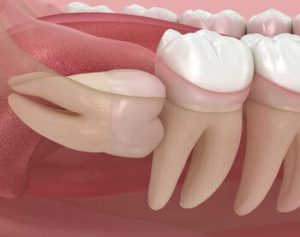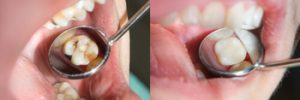Wisdom tooth pain can creep in quietly or hit you with a sudden throb, disrupting your day and leaving you wondering how long the discomfort might stick around. Whether it’s a dull ache in your jaw or sharp pain near the back of your mouth, wisdom teeth have a way of making their presence known.
So, how long does wisdom tooth pain last? The answer isn’t always straightforward. It can vary from a few days to a few weeks, depending on what’s causing the pain and how it’s managed.
In this blog, we’ll explore everything you need to know about the duration of wisdom tooth pain, what causes it, how to manage it, and when to seek help from your dentist. We’ll keep it warm, simple, and clear because your oral health deserves attention and clarity.
What Are Wisdom Teeth and Why Do They Cause Pain?
Wisdom teeth, or third molars, are the final set of adult teeth to develop, usually surfacing between the ages of 17 and 25. While some people have no problems when they emerge, many experience pain, swelling, and discomfort.
The pain is often a result of:
- Impacted wisdom teeth (trapped under the gum or jawbone)
- Misaligned wisdom teeth pressing against surrounding teeth
- Wisdom tooth growing pain as it pushes through the gum line
- Tooth decay if cleaning the area is difficult.
- Gum disease due to trapped food and bacteria
- Jaw pain and throbbing pain when inflammation spreads
So, How Long Does Wisdom Tooth Pain Last?
The duration of wisdom tooth pain varies from person to person. Here’s a general idea:
- When erupting naturally: If your wisdom tooth is growing in a healthy direction and has enough space, the pain may last a few days as the tooth breaks through the gums. Mild swelling or painful gums is common during this time.
- Pain can persist for several weeks or come and go if the tooth is impacted. This type of pain often returns until the tooth is addressed or removed.
- After wisdom tooth removal: Pain from wisdom teeth extraction generally lasts around 3 to 7 days, though minor discomfort may linger for a couple of weeks as the area heals.
The healing process varies depending on how difficult the wisdom tooth extraction was and whether there were any complications, such as bleeding gums or infection.
What Does Wisdom Tooth Pain Feel Like?
When people experience wisdom tooth pain, it often shows up as:
- Dull or throbbing pain at the back of the mouth
- Swollen gums around the affected area
- Difficulty opening the mouth or chewing
- A bad taste in the mouth or bad breath
- Sensitivity when brushing or eating
If your wisdom tooth pain becomes severe or begins to radiate to your jaw or ear, it could indicate a more serious issue that needs prompt attention from a dentist.
Common Causes of Persistent Wisdom Tooth Pain
Still wondering why the pain sticks around? Here are some causes of long-lasting discomfort:
1. Impacted Wisdom Teeth
When wisdom teeth don’t have enough room to emerge, they may remain trapped under the gums or bone. This causes persistent pressure, swelling, and sometimes infection.
2. Infection and Inflammation
Partially erupted wisdom teeth may leave a flap of gum tissue that traps food and bacteria, which can result in painful gums, abscesses, and gum disease.
3. Pressure on Other Teeth
Wisdom teeth that grow in at an angle can press against nearby teeth, leading to shifting, crowding, and ongoing discomfort.
4. Tooth Decay
Since wisdom teeth are hard to reach, they’re more prone to decay. Cavities or infections in these permanent teeth can lead to lingering pain.
Managing Wisdom Tooth Pain at Home
Not everyone needs immediate surgery; sometimes, you just need wisdom tooth pain relief while waiting to see your dentist. Try these tips:
Warm Salt Water Rinse
A simple rinse with warm salty water helps clean the affected area, reduces bacteria, and treats swollen gums.
Cold Compress or Ice Pack
Place a cold compress or an ice pack on the outside of your cheek to help ease pain and minimise swelling.
Over-the-Counter Painkillers
Paracetamol or ibuprofen can help manage pain, especially if you’re dealing with jaw pain or throbbing pain.
Soft Foods Only
Choose soft foods such as soup, yoghurt, mashed potatoes, and smoothies to prevent aggravating the sensitive area.
Keep Your Mouth Clean
To lower the risk of infection, gently brush the gum line, floss (if possible), and rinse with antibacterial mouthwash.
When to See a Dentist About Wisdom Tooth Pain
Some pain is part of the normal process, but certain signs suggest it’s time to see a dentist:
- Pain lasting more than a few weeks
- Difficulty chewing or difficulty opening your mouth
- Swelling that gets worse
- Bleeding gums or pus near the tooth
- Bad breath or a persistent bad taste
- Fever or general feeling of unwellness
If you notice any of these, it could point to other dental concerns or a need for wisdom tooth removal.
How Long Does Pain Persist After Having Wisdom Teeth Removed?
After wisdom teeth removal, pain usually peaks within the first 48 hours and gradually improves. Here’s what you can expect:
- First 2 days: Mild to severe pain, swelling, and possibly bleeding. Use ice packs and pain relief.
- Days 3 to 7: Pain subsides, but you might still feel some discomfort.
- After 1 week: Most people return to normal eating and activities.
- After 2 weeks: Full healing progresses, though deep tissue recovery may take longer.
If the pain continues, gets worse, or new symptoms appear, be sure to contact your dentist for professional guidance.
Is It Necessary to Remove Wisdom Teeth?
Not all wisdom teeth need to be extracted. Your dentist will assess:
- Whether they’re causing pain or discomfort
- If they’re impacted or at risk of affecting other teeth
- If there’s a risk of tooth decay, gum disease, or damage to nearby structures
In some cases, wisdom teeth coming in straight with enough space may not need removal at all. But if they’re causing pain or likely to lead to dental complications, wisdom tooth extraction is often recommended.
How Can You Prevent Wisdom Tooth Pain in the Future?
Even if your wisdom teeth haven’t erupted yet, keeping your mouth healthy goes a long way. Here’s how:
- Visit your dentist regularly to keep an eye on the growth of third molars
- Brush and floss daily, including around the back molars
- Use mouthwash to reduce bacteria
- Maintain a healthy smile with a balanced diet and regular oral care
Early monitoring and intervention can help avoid serious complications and the need for emergency treatment.
Final Thoughts: Wisdom Tooth Pain Does Not Have to Last Forever

Understanding the cause of your pain, following appropriate treatment, and practising good oral health habits can make all the difference. Whether you’re managing the discomfort at home or preparing for wisdom teeth removal, taking the right steps early will keep your smile healthy.
If your tooth pain lasts or you have questions about wisdom teeth extractions, always reach out to your dentist for further advice. Book a dental visit today at (08) 7078 8263.
Note: Any surgical or invasive procedure carries risks. Before proceeding, you should seek a second opinion from an appropriately qualified health practitioner.
References
- Cleveland Clinic. (n.d.). Impacted wisdom teeth. https://my.clevelandclinic.org/health/diseases/22296-impacted-wisdom-teeth
- Healthline. (n.d.). How to make a cold compress. https://www.healthline.com/health/make-cold-compress
- Mayo Clinic. (n.d.). Cavities/tooth decay: Symptoms and causes. https://www.mayoclinic.org/diseases-conditions/cavities/symptoms-causes/syc-20352892



